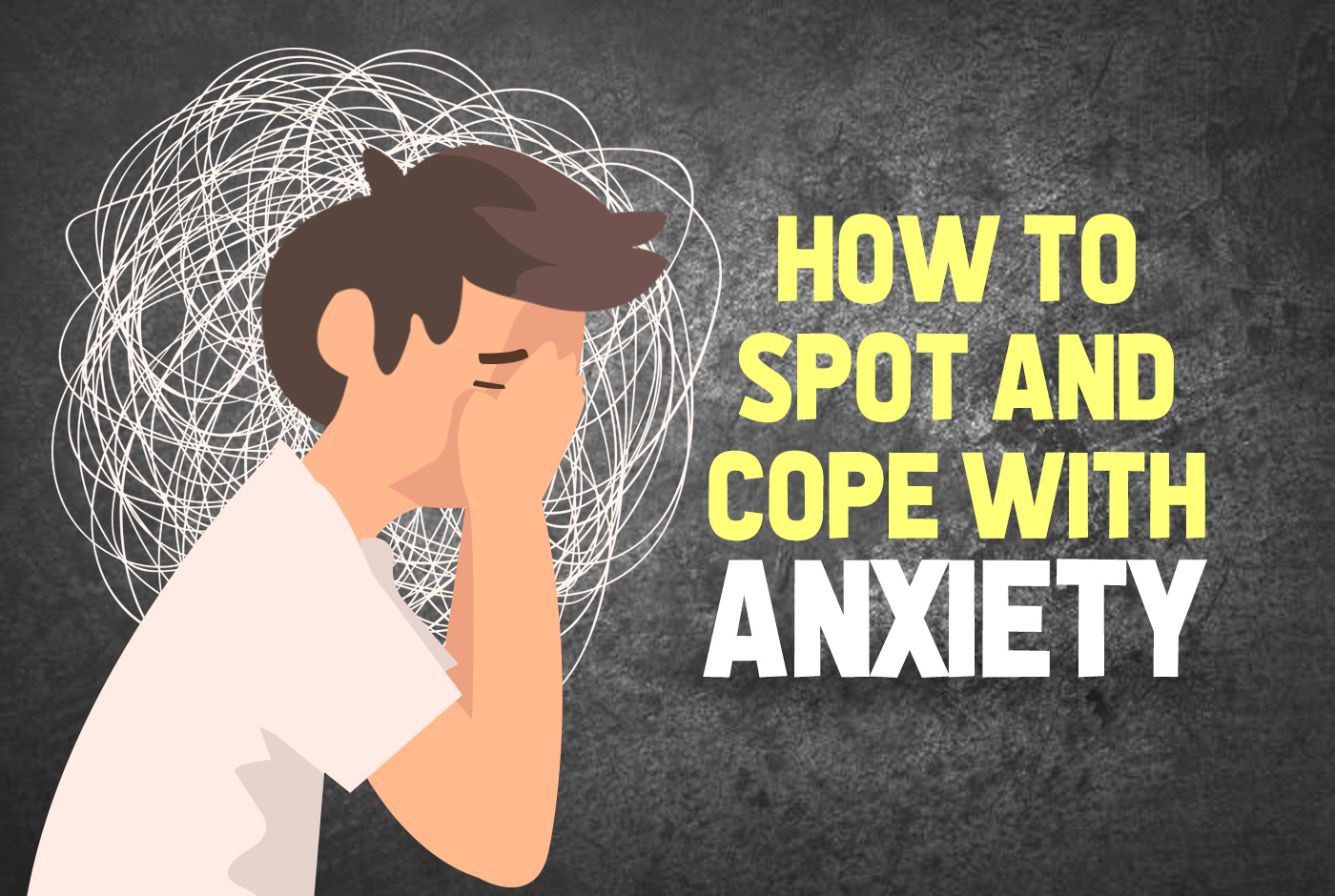How to Spot and Cope with Anxiety

Could you be facing anxiety?
Most people may not have lived through and experienced a pandemic like COVID-19. The adjustment to measures such as lockdown, social distancing and work from home may be extremely stressful for some people. The loss of opportunities, uncertainty in the availability of vaccine for the virus and insecurity of the future may cause an overwhelming sense of uneasiness. It is normal to feel concerned, worried and anxious. It is, therefore, important to take care of yourself and your mental well-being in these unprecedented times. Always reach out for resources and help if you need to and contact a healthcare provider if stress and anxiety gets in the way.
Are you feeling stressed out that COVID-19 is turning your life upside down? Is working from home or fear of infection taking an emotional toll on you? It is normal to feel worried and anxious during the pandemic. It is important to understand anxiety and its symptoms in order to manage it.
Anxiety is a natural body response to stress. It is hard-wired in the human body system to alert you on any potential “dangers” and activate your fight or flight responses. It typically manifests as a state of feeling unease such as worrying, nervousness or fear. These feelings of anxiety can be brief, lasting for a few minutes, or long lasting for days, depending on the situation that you are facing.
The first step in managing anxiety is to recognize the symptoms. Here are 5 symptoms that may suggest anxiousness and some approaches to help better manage them.
1) Increased Heart Rate
A normal resting heart rate is between 60-100bpm (beats per minute) depending on individual. When experiencing anxiety, your resting heart rate may rapidly increase much more than your normal bpm despite not doing any strenuous activities.
Some may also experience heart palpitation. Heart palpitation may feel like your heart is racing, pounding, fluttering or maybe even as though your heart is skipping a beat. Such rapid heart rate/ heart palpitation is usually short-lived, but it is important to learn how to manage it to reduce the cardio stress on your heart.
When experiencing a rapid heart rate, try to practice focus and deep breathing exercises. Try to breath in for 4 counts and breath out for 4 counts over a short 5mins time frame. Do not rush through your counting. If it is possible, try closing your eyes and just focus on the counting and breathing. This will help to slow your heart rate and eventually calm you down.
You may also practice the 4-7-8 technique on a regular basis to help you gain a better control over your breathing. The 4-7-8 technique includes breathing through your nose for 4 counts, and then holding your breath for 7 counts, and finally breathing out through your mouth for 8 counts.
2) Sleep Disturbance
Your sleeping patterns may reflect your mental and emotional state. One common reported symptom of anxiety includes having trouble falling asleep or waking up in the middle of the night and being unable to go back to sleep. While there are no scientific evidences that insomnia and anxiety are interlinked, more than often, professionals observed that when anxiety is being treated, the sleep quality is also improved.
Aromatherapy can come in the form of essential oil, incense or candle and it works through the sense of smell or skin absorption. You may use it with diffusers, bathing salts, body oils and lotions or/ and masks. Scents such as lavender, chamomile, green tea and sandalwood are known to be soothing and often used for relaxation or calming effect.
Caffeine is known to increase your alertness by blocking the effects of adenosine, a brain chemical that makes you feel tired. It also triggers the release of adrenaline and increase energy. Reducing your intake of caffeine may help to put your mind more at ease and reduce the sense of heightened anxiousness.
The hormone melatonin also plays a role in your sleep cycle by helping your body to know when it is time to sleep and wake up. Melatonin supplements generally may help to provide relief for those experiencing insomnia, jetlag or for those with jobs that have disruptive sleep cycles. However, different people react differently to medicines and supplements. It is important to consult a doctor if you have any doubts or any other health conditions before embarking on a supplement plan.
3) Chronic Fatigue
Fatigue alone may not be a strong signal of anxiety. However, if coupled with excessive worrying and being constantly on high alert, it could be a sign of an emotional distress. Anxiety may sometimes drive your body system into overload with overwhelming thoughts and increased heart rate, blood pressure and muscle tension. It can drain your mental and physical energy being in that situation for a continuous period of time. Eventually, you may start feeling exhausted despite not having any other health conditions and not doing much activities. Chronic fatigue may also be a result of insomnia.
Exercising may sound like an irony and the last thing you would want to do when feeling tired is to exercise. However, studies have shown that regular exercises can reduce the symptoms of fatigue and lead to more quality sleep.
Implementing a short 15mins low-intensity workout daily can go a long way to help increase and regulate your energy flow, reducing feelings of fatigue. Exercising may also help to take your mind off your thoughts for a brief moment. It is easier to manage your mental health when your physical health is being well taken care of.
Doing some gentle stretching before going to bed may also help to relax your mind and loosen any muscle tension in your body. You may consider adopting some simple stretches and exercises recommended by Raffles Medical Senior Family Physician, Dr Derek Li.
4) Stomach Discomfort
When experiencing stress or anxiousness, your body will release stress hormones. These hormones activate your nervous system to create an instinctive reaction to keep you safe from potential threats. A sudden surge of stress hormones may end up affecting your digestive system. As such, some may experience stomach discomfort, stomach aches or a loss of appetite due to other physical symptoms. Some other digestive effects may be constipation, diarrhea, indigestion or nausea.
Strengthening your gut health may help to soften the impact that anxiety has on your digestive system. Protect your gut and reduce the stress placed on your stomach when you adopt a healthier eating pattern. Try to opt for more easily digestible food that will not further upset your digestive system such as rice, potato, steam vegetables and lean protein. High-fiber food and food that are high in fat, salt and sugar should be avoided as they can be more difficult to digest. Dairy products should be avoided when experiencing stomach aches and diarrhea.
Did you know that certain food and nutrients may also help to regulate your mood and lower stress and anxiety?
These include:
- Food high in Omega 3 Fatty Acids (i.e. Salmon, mackerel, sardines, trout and herring)
- Eggs
- Yoghurt
- Dark chocolate
- Chamomile
- Green Tea
- Turmeric
*All food should be taken in moderation.
5) Excessive worrying and feelings of apprehension or dread
A significant change in physical and emotional behavior over a period of time may indicate anxiety, stress overload or an emotional distress. Certain environment or situations may bring about overwhelming thoughts and worries, so much so that it starts to interfere with your work, relations or other areas of life. Perhaps something you used to love doing no longer interest you, or you start turning down friends’ invitation because of a sense of impending danger or panic. Emotional and cognitive changes can affect a person’s ability to function and connect.
Penning down your thoughts and experiences is a good way to organize everything that is inside your head. It may help you to identify what are your anxiety triggers, what are the things that makes you feel uncomfortable and where your boundaries lie. It is a good way to analyze your thinking patterns, ways you can better manage your thoughts and how you can improve your reaction in different situations.
If journaling is not your thing, you may start by writing just words describing your emotions on one post-it each and laying them all out; i.e. worried, scared, stressed, angry, frustrated, etc. You can then sit down and focus on each emotion individually and briefly indicate what you think is causing that emotion. You may also try doing up simple mind maps to help trace your thoughts. If you are a visual person, you may use different colored pens to help you identify different emotions/ situations or you may try drawing instead.
Anxiety is not uncommon, and everyone do experience it in some point of their lives. However, anxiety may become a health concern when it starts to affect your physical health or/ and ability to do daily work or tasks. Confiding to someone such as a family member, a close friend or someone you can trust is one of the ways to release your emotions. If something is persistently causing you distress, seeking professional advice or counselling therapy may enable you to better cope and manage your confounding situations and well-being.
If you would like to speak to someone, you may contact or make an appointment with Raffles Counselling Centre at +65 6311 2330 or specialist@raffleshospital.com.
Raffles Counselling Centre
Address: Level 8,
Raffles Specialist Centre
585 North Bridge Road
Singapore 188770
Tel: (65) 6311 2330
Fax: (65) 6311 1186
Email: specialist@raffleshospital.com
Opening hours:
Mon - Fri: 8.30am – 6.00pm
Sat: 8.30 am - 1.00 pm

















